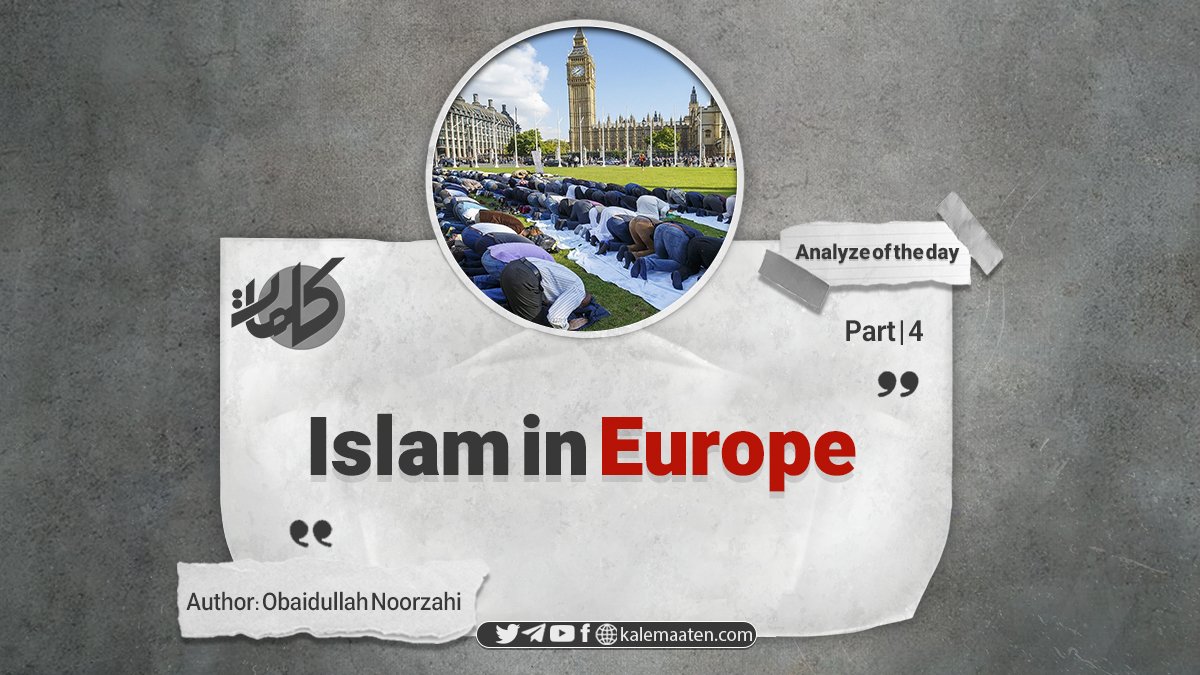
Author: Obaidullah Noorzahi
Islam in Europe (Part Four)
What Did Europeans Do to Muslims?
Despite the good treatment and unwavering support of Muslims for Christians, along with the significant cultural contributions they made to the followers of this religion, Europeans at various historical periods displayed ruthless hostility and resentment towards Muslims.
“The movement or revival of European science and technology, which depended on the extensive use of Islamic resources, is more related to the connection between East and West. Europe benefited from the Islamic world more than is commonly imagined. However, it ignored this generosity and never acknowledged or appreciated it. Europe should have appreciated this kindness instead of responding with hostility and resentment. Not only did it fail to do so, but this hostility deepened over time to the extent that the word ‘Muslim’ evoked a wave of negative feelings among them.”
One of the most apparent manifestations of this hatred was the Crusades. These wars, which comprised eight distinct stages, primarily stemmed from religious fanaticism and the instigation of Christian missionaries. A priest who visited the tomb of Jesus in Jerusalem became infuriated that the Holy Land was under Muslim control and incited the Christian populace to war.
Pope Urban II of France convened a council in Clermont, where he rallied clergy and church lords to call upon Christians to fight the Muslims. Since all participants in these wars wore a red cross on their shoulders, they became known as the Crusades.
During these wars, on July 6, 1099, Jerusalem was brutally captured by the Christians after a merciless massacre; however, it was not long before Saladin Ayyubi recaptured the city with exemplary bravery and courage in September 1187 (583 AH). When the Muslims re-entered the city, Islamic flags were raised on the walls, and the mosques were cleared of statues and crosses. This battle became known as the Battle of Hattin.
Albermalle recounts in his history: “Godfrey de Bouillon, the commander of the Christian army, reported to the Pope, saying: ‘If you wish to know what was done to the enemies who fell into our hands in Jerusalem, know that our men were running in the portico of Solomon and the temple, knee-deep in Muslim blood; the blood reached the knees of the ink.’”
Gustave Le Bon narrates: “Our troops delighted in the massacre of Muslims like a lion whose cub has been stolen. They dismembered children and slaughtered the young and old alike. They opened the bellies of the slain to reveal the jewels within, massacring all those who sought refuge in the palaces.”
Le Bon admits: “The abominable acts and behavior of the Crusaders in all their campaigns positioned them among the most savage and senseless brutes on earth.” Raymond Dagel, an eyewitness to the events, recounts the horrifying tale of Christian barbarity: “It was exceedingly difficult to carve a path through the dismembered limbs of the Muslims, and the blood of the slain reached as high as the knees.”
One of the most horrific atrocities of the Crusades took place at Ma’arrat al-Nu’man, where Christians massacred all Muslims who had sought sanctuary in mosques or crypts. More than 100,000 were brutally tortured or killed.
“Who is not ashamed of the incitements of the Christian establishment,” writes John Devonport in his book An Apology to Muhammad and the Quran, “which led to the most intense prejudices and cruel oppressions against Muslims, and to countless atrocities committed against a people who had shown such humanity and support to the Spaniards?”
These crimes were clear evidence of the injustice and organized hostility of the Church and Europeans toward Muslims.
In another part of his book, he states: “No invading force of any nation has ever been more depraved, wicked, shameless, lustful, and immoral than this group that went forth in the name of holy war.”
Will Durant describes the horrific crimes committed by Christians who came to “save” Jerusalem as follows: “Wherever a man turned, he was surrounded by the bodies of slain and carcasses of horses. Women were beaten to death with whips, infants were seized by their legs and forcibly separated from their mothers’ breasts, thrown over walls or smashed against pillars. As a result, seventy thousand Muslims who remained in the city were slaughtered.”
The Crusades brought disaster, damage, and loss to the Muslims; however, they also prompted Europeans to understand their identity and experience the attractive aspects of Islamic life, leading them to attempt to imitate and adopt Muslim culture upon returning home. The Crusades spurred geographical exploration among Europeans, revealing that other states existed beyond the Islamic nations.
In Andalusia, Europeans committed many atrocities against Muslims, who, as John Devonport notes, “during their 800 years of rule over Spain, had not even inspired the slightest example of oppression or tyranny in the eyes of opposing historians.”
Christians expelled Muslims from Andalusia during the Spanish rule, particularly under the orders of Philip II starting in 1610, but this move took place at a time when 75 percent of Muslims had already been killed before leaving Spain.
“Muslims were given the choice between death and Christianity, and many were forced to convert. Those who resisted this order were burned at the stake. The accused were executed in groups or families.” The author also recounts another tragic incident: “In a place called Calicut, a number of ships carrying Muslim provisions were seized by Christians, and the passengers on these ships, totaling more than 800, were attacked. The Christians severed everyone’s hands, ears, and noses, and then they ruthlessly returned these mutilated individuals to the ships and set the vessels on fire, incinerating the half-dead bodies of the Muslims.”
Continues…


